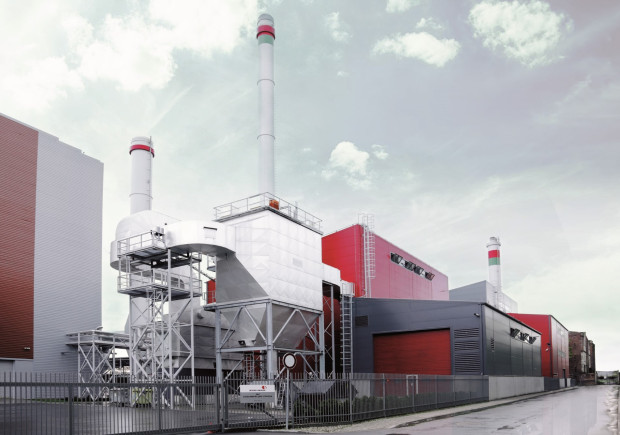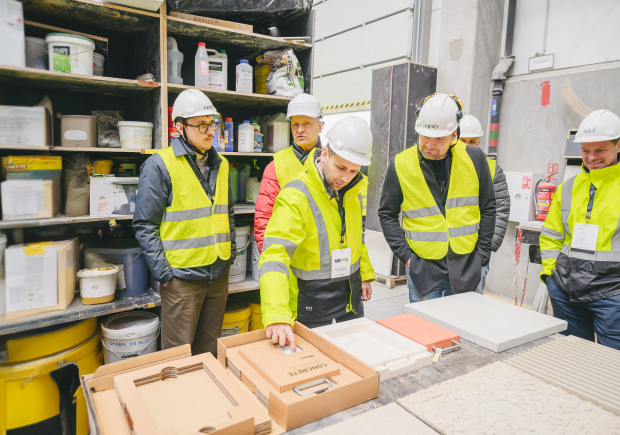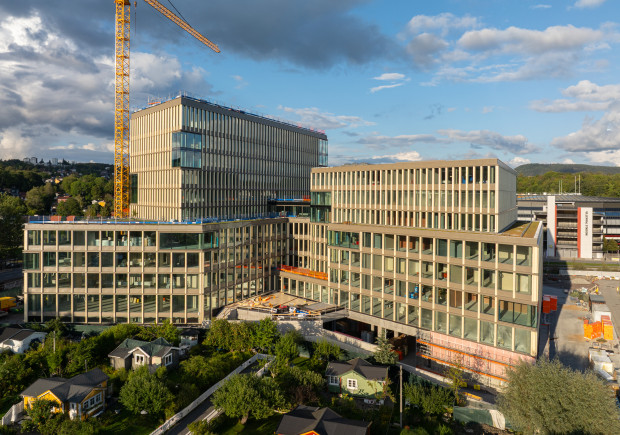On 21 November the new SIA “Liepājas enerģija” woodchips boiler house (30 MW) was opened, this is the final company investment project, which is implemented according to the Investment and Development Plan 2009–2013 approved by AS “Latvenergo”, Liepāja City Council, and SIA “Jaunā fabrika” by attracting co-financing of the EU Cohesion Fund. By implementing investment projects, SIA “Liepājas enerģija” has reduced the heat energy tariff by 22%, heat loss for more than two times, and increased the company efficiency by 28%. Along with launching operation of the biomass boiler house, approximately 60% of heat energy is produced by using local renewable energy resource — wood chips.
Biomass boiler house is an important element of the EU Cohesion Fund project “Reconstruction of heating source at Kaiju iela 33, Liepāja”. The project’s total eligible costs reach ~ 8.1 million lats, including 50% of EU co-financing. Within the project, a boiler house with two modern wood chip boilers (15 MW each) and all necessary auxiliary facilities and fuel store houses have been constructed, as well as the old boilers have been reconstructed. For producing heat energy, the new boiler house will use local fuel — wood chips, allowing for additional ~40% reduction of imported natural gas in the company fuel balance.
Anatolijs Suškovs, Chair of Board of SIA “Liepājas enerģija”:
“Biomass boiler house is another economically substantiated project aimed at company’s long-term operation and proves that modern central heat supply is a predictable, perspective, and competitive service.”
Biomass boiler house is the largest investment project implemented by SIA “Liepājas enerģija” according to the Investment and Development Plan approved by the company shareholders (AS “Latvenergo”— 51%, Liepāja City Council — 39%, SIA “Jaunā fabrika” — 10%) by using co-financing of the EU Cohesion Fund. In total, the company has attracted one of the largest investments (more than 9 million lats) by the EU Cohesion Fund in its field.
Bio-CHP plant was put into operation in 2012, just before the heating season, but two EU Cohesion Fund projects were implemented during 2010–2012, within which 18 km of arterial heating networks were rearranged.
Āris Žīgurs, Chair of Board of AS “Latvenergo”:
“People in energy sector are not interested in quick success and one-day victories. We have to think in perspective and be able to take decisions that will yield results also in one-year time, in five and ten years. Such decisions are extremely complicated and quite often desperate compromises where one has to balance between price and quality, immediate benefit and safe solution in long-term. Therefore, I am glad our partners in “Liepājas enerģija” are wise and think about sustainability in the sector. It benefits our clients!”
Each of investment projects of SIA “Liepājas enerģija” has resulted in reduction of heat tariff, in total of 22%.
Uldis Sesks, Mayor of Liepāja:
“By implementing biomass boiler house development projects and introducing wood chips as fuel, the company “Liepājas enerģija” has succeeded to place Liepāja among cities and towns with the lowest heat energy tariffs. The heating system in Liepāja, which is a heritage from earlier years, was one of the lowest-grade and most inefficient systems in Latvia, but we have managed to change this situation over a comparatively short period of time, and the heating tariff has been reduced already four times over the last three years, thus allowing inhabitants to pay 22% less than before.”
The new heating source and the bio-CHP plant was built by AS “UPB”, whose tender was acknowledged as most economic, by involving also one of the leading manufacturers of facilities fuelled with biomass — the Austrian company “Polytechnik”.
Uldis Pīlēns, Chair of Board AS “UPB”:
“I want to say thank you to all involved persons who worked with us under the implementation of these important UPB turnkey projects. The 1st stage (11 months) included construction of a biomass CHP plant, but the 2nd stage (12 months) included boiler house (30 MW), with design works, construction, delivery, installation, setting and launching of high-quality biomass technologies. We think that this is a good result for reducing Latvia’s dependence on energy import and proving competitiveness of Latvian entrepreneurship.”
See the video here>>
www.liepajniekiem.lv
21.11.2013



